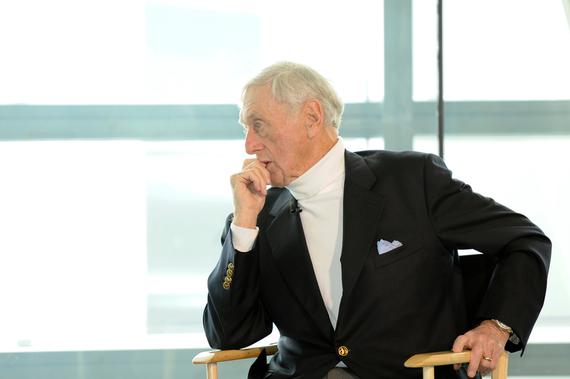Facing History is saddened to note the passing of lifelong civil rights champion, politician, and tireless journalist John Seigenthaler. Mr. Seigenthaler died Friday. He was 86.
A friend of Facing History, Mr. Seigenthaler shared his experiences from the frontlines of America’s fight for racial equality with many Facing History teachers, students, staff, and community members.
“It is so important that we not forget. And it is so important that a younger generation not forget,” Mr. Seigenthaler said at a March 2012 talk at Columbia University Graduate School of Journalism, of which Facing History was a co-sponsor.
 John Seigenthaler in 2009, speaking to Facing History audiences about the civil rights era. Photo courtesy of Rinze van Brug.
John Seigenthaler in 2009, speaking to Facing History audiences about the civil rights era. Photo courtesy of Rinze van Brug.Mr. Seigenthaler, who grew up in Tennessee, attended George Peabody College for Teachers, now a branch of Vanderbilt University, and served in the Air Force before starting his career in journalism at the Tennessean newspaper. He later went on to work on John F. Kennedy’s 1960 presidential campaign, and for his friend Robert F. Kennedy in the Justice Department.
In May of 1961, Mr. Seigenthaler traveled to Montgomery, Alabama, as a representative of Attorney General Kennedy’s to monitor the Freedom Rides, when more than 400 people, mainly college students but including those from all walks of life, risked their lives, traveling together by bus through the Deep South. It was an act of resistance that shook the segregated Southern states, and brought people from across America together to fight for a single goal: a safe, inclusive society. The events turned violent when an angry mob met the riders in Montgomery. A witness to the violence, Mr. Seigenthaler tried to step in and protect two young women. He ended up beaten and bloodied, left on the side of the road for 25 minutes.
He recounted the events for Facing History audiences, most recently in March 2012, during a conversation with Rev. Dr. Bernard LaFayette Jr., cofounder of the Student Nonviolent Coordinating Committee (SNCC) and participant in the Freedom Rides. Gerald Stern, Facing History board member and civil rights attorney, moderated the event.
“John Seigenthaler was a strong friend of Facing History. He was a modest, charming, and strong-willed man,” Mr. Stern said this weekend. Of the opportunity to hear Mr. Seigenthaler and Dr. LaFayette, Mr. Stern also had a few words. “I felt then, as I still do, moderating that panel, what a rare, historic moment this was with two of the legendary heroes of the civil rights struggles of the ‘60s there in person to relive for us their memories of that most important time in our American history. It gave students studying Facing History, as well as many of Facing History's teachers, trustees, and supporters, the opportunity to see our message in real life - don't be a bystander, be an upstander. Take action to make a difference when you can.”
After his time in politics, Mr. Seigenthaler returned to journalism. He became editor of the Tennessean in 1962, and turned it into what the Washington Post this week described as “one of the South’s most vigorous voices in support of civil rights.” He led the paper as editor and publisher for almost 30 years, and was also a founding editor of USA Today and later started the First Amendment Center, an institute promoting freedom of the press that is now affiliated with the Newseum in Washington, D.C. He was the author of four books and chaired the selection committees of the Robert F. Kennedy Book Award and the John F. Kennedy Library Foundation’s Profiles in Courage Award.
Last week, the newspaper that he led for so many years published Mr. Seigenthaler’s obituary. In it, Gannett Co. Inc.'s retired Senior Vice President/News Phil currie reflected on Seigenthaler's legacy. "John Seigenthaler was not just an amazing student of history, he made history," he said.
Learn more about the Freedom Rides of 1961. Download Facing History’s free guide Democracy in Action: A Study Guide to Accompany the Film "Freedom Riders" and explore educator workshops that help teachers learn about southern segregation laws and models of political resistance during the civil rights movement.

